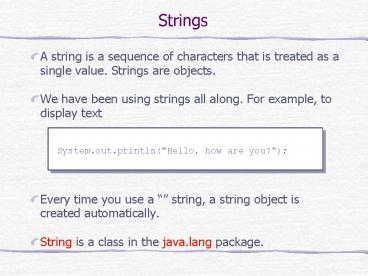Strings PowerPoint PPT Presentation
1 / 17
Title: Strings
1
Strings
- A string is a sequence of characters that is
treated as a single value. Strings are objects. - We have been using strings all along. For
example, to display text - Every time you use a string, a string object
is created automatically. - String is a class in the java.lang package.
2
Explicit String Objects
- A declaration and object creation are needed for
instances of the String class. For example,
We normally use shorthand notation (only for
Strings)
3
Explicit String Objects
- Blitititi out to reality StringVar.java
- Blitititi out to reality StringVar2.java
- Blitititi out to reality StringVar2.java
4
String variables are References - 1
Code
Both word1 and word2 are allocated memory (to
store references), but the objects themselves are
not yet created, so they both contain null.
L
word1
word2
L
State of Memory
5
String variables are References - 2
Code
One String object is created and assigned to
word1, so word1 contains the address of this
object.
word1
word2
L
State of Memory
6
String variables are References - 3
Code
Content of word1, which is an address, is
assigned to word2, making word2 refer to the same
object.
State of Memory
- Gadzook out to reality StringAlias.java
7
Concatenating Strings
- The operator can also concatenate strings.
- A new string object is created - the operands are
not affected - Gadzook out to reality StringCat.java
8
Command line Strings
- The formal arguments to the main method receive
strings from the command line arguments. - When running a program, supply command line
arguments after the program name, e.g., - java MyJavaProgram cat 27 'Java is great!'
- has three command line arguments.
- Gadzook out to reality StringCat.java
9
Accessing Individual Elements
- Individual characters in a String accessed with
the charAt method.
10
Determining the Size
- We determine the number of characters in a String
with the length method.
Error because no object is created for str3, so
it is a null.
- Olipidoo out to reality StringVowels.java
- Olipidoo out to reality StringWords.java
11
Equality () vs. equalsCase 1
word1 and word2 point to the same object.
word1 word2
word1.equals( word2 )
12
Equality () vs. equalsCase 2
word1
word2
word1 and word2 point to different objects having
the same string.
word1 word2
word1.equals( word2 )
13
Equality () vs. equalsCase 3
word1
word2
word1 and word2 point to different objects with
different strings.
word1 word2
word1.equals( word2 )
- Quixote out to reality StringJavas.java
14
Other Useful String Operators
15
Strings and Methods
- Strings are reference variables, so (like arrays)
formal parameters point to the actual parameter
data - Strings returned from methods point to the data
created in the method - Likidylik out to reality StringMethod.java
16
Strings are Immutable
- A String object is immutable, which means that
once a String object is created, is cannot be
changed. - It is not possible to add, delete, or modify
characters of a String object. - The methods of the String class, such as
toUpperCase and substring, do not modify the
original string they return a new string. - Java adopts this immutability restriction to
implement an efficient memory allocation scheme
for managing String objects. - Oieeeeiooo out to reality StringImmut.java
17
StringBuffer
- Creating a new string from the old one will work
for most cases, but sometimes manipulating the
content of a string directly is more convenient. - Manipulation means operations such as replacing a
character, appending a string with another
string, deleting a portion of a string, and so
forth. - Java has a StringBuffer class for this.
- StringBuffers are created from strings (no
shorthand) - Ay out to reality StringBufferX.java
- Ay out to reality StringBufferMake.java

